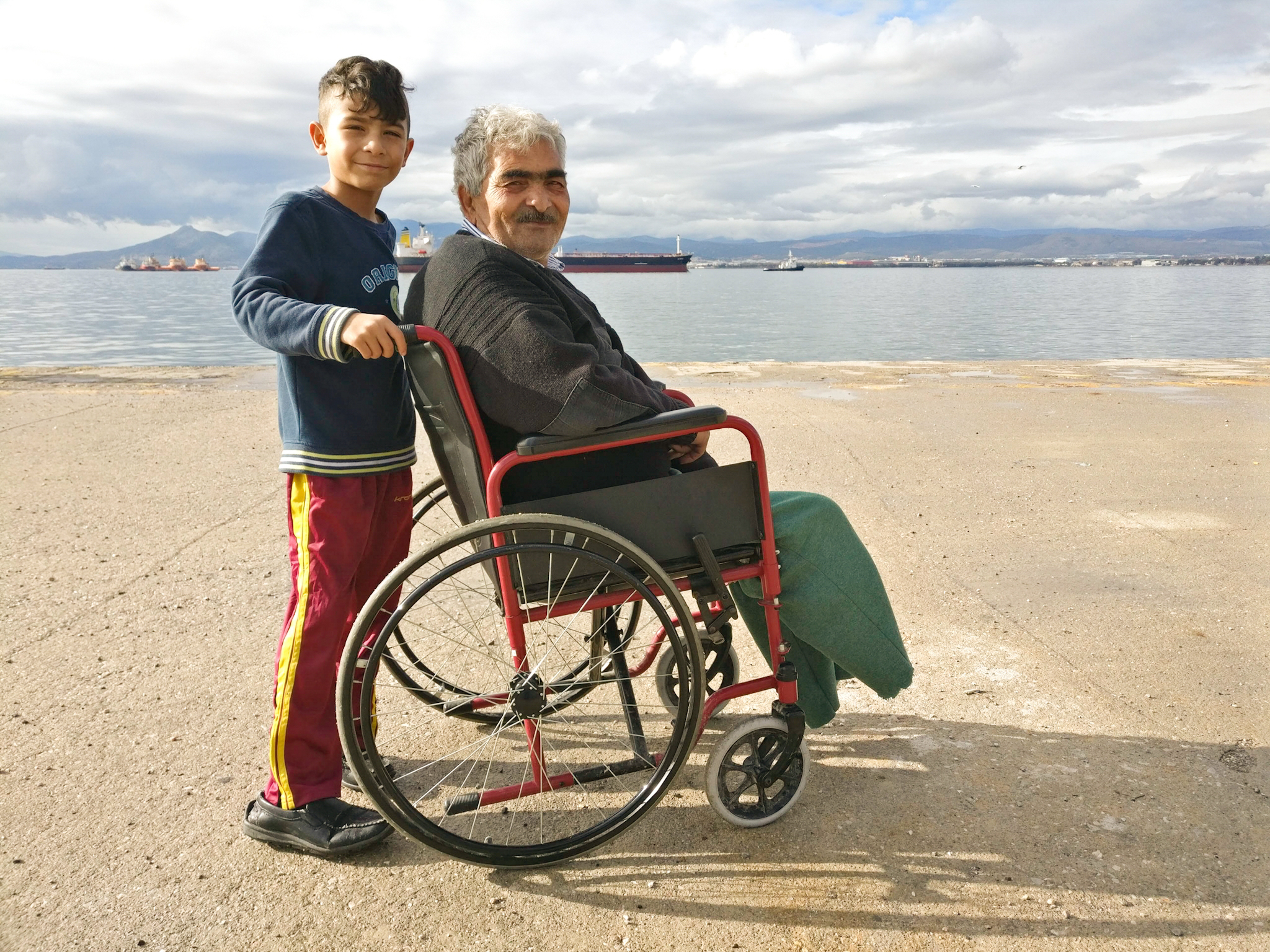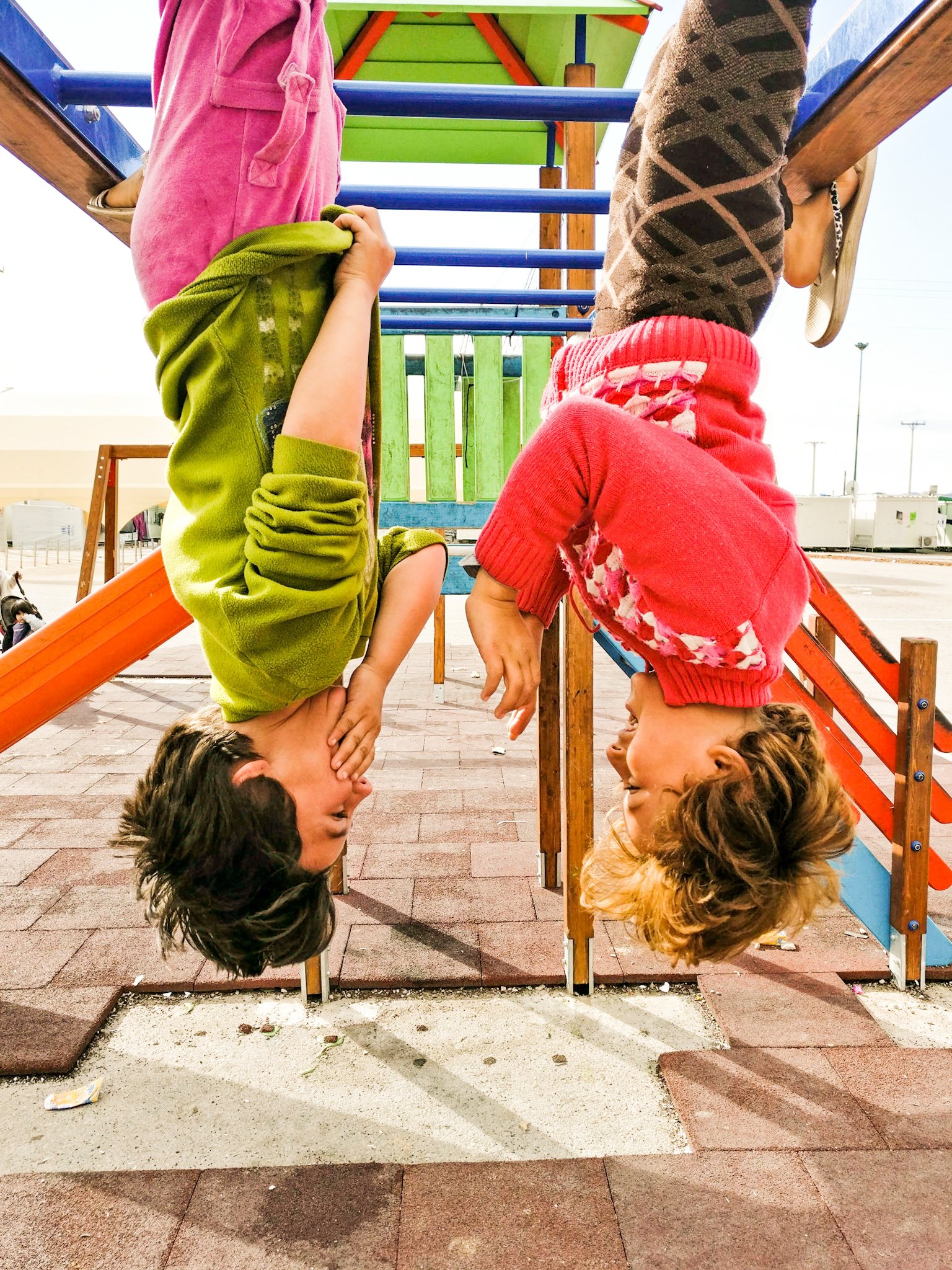Zaid Doski’s schedule sounds a lot like that of a typical teenager on summer break, sleeping in and staying up late watching scary movies. When he wakes up, he congregates with chatty pals at one of the handful of shops that define any neighborhood: the candy-countered corner store, the fried food-peddling luncheonette, the boisterous barbershop.
But Zaid and his friends are far from typical teenagers. When I meet them for the first time in early 2017, they’re refugees in Greece’s biggest refugee camp, Skaramagas, and the hot topic of gossip here is one that few Western kids would relate to.
“The thing we talk about most is relocation,” says Doski, the tall, spiky-haired 17-year-old who fled Mosul, Iraq, when ISIS invaded the city in 2014. “We talk about when we will go and what will happen there.” (Doski has since found asylum in France.)
Skaramagas’ 3,200 refugees wait out the sometimes years-long relocation process in caravans, trailer-like homes with rare camp luxuries like refrigerators, convection ovens, and plumbing. Four hundred and ten of these caravans are lined up in rows leading to a common area with a community center, a playground, and offices for non-governmental organizations (NGOs).
In an effort to simulate community life as usual, camp management, NGOs, and refugees are working together to offer traditional schooling, holiday celebrations, and sports tournaments—there are even competitions for Skaramagas Got Talent, a sort of variety show. Clothes and toiletries are distributed periodically, and residents now receive debit cards with monthly stipends (an unmarried person receives 150 euro per month) to cover food costs and beyond.

(Photo: Matt Alesevich)
One sector that refugees have jump-started on their own, however, is the economy, the main artery of which runs along the camp’s western border on the Gulf of Elefsina. As camp authorities and NGOs cover basic necessities, running businesses can help proprietors reclaim some of the self-determination and financial flexibility they were accustomed to back home.
Most of the camp’s shops—from the one-person SIM card-and-cigarette booths to the busier food stalls and grocery stores—are patchwork structures of scrap metal, wood, and white United Nations-issued tarp. Some shop owners, like Sammy Hamod, who arrived here from Al-Hasakah, Syria, and ran a popular grocery store, convert their bed frames into building materials, opting to sleep on the floor.
The dozens of shops get their appliances and accessories from a scrappy second-hand weekend market in Athens’ Eleonas neighborhood, a short bus ride from Skaramagas. The juice bar paid 15 euro for its coffee machine, and the laundromat between 100 and 150 euro for each of its four washers. For food supplies, shop owners scour Egyptian and Pakistani stores in Athens’ central Omonoia neighborhood, a hub for immigrant communities.
“Everything you see here is from Eleonas,” Doski says one evening, sweeping his hand across one of the camp’s two gaming cafes, which holds desktop computers that cater to young adults with shooting and racing games.
As with any economy, businesses open and fold; new ideas and owners replace the old.
When Doski and I chatted in the gaming cafe last January, it was under new management. When its original owner received asylum in Norway, he sold his shop to the highest bidder—Alaa, a smiley 27-year-old from Latakia, Syria, who offered 500 euro cash. Since taking over, Alaa has added a pool table, a foosball table, a PlayStation, and a flat-screen television to the cafe.

(Photo: Matt Alesevich)
Most women, like Doski’s mother, who helps care for her two-year-old granddaughter, are tasked with housekeeping and childcare (over a third of camp residents are under 18), leaving the camp’s economy dominated by young to middle-aged men.
In an attempt to bring women into the service fold, Rita Continakis, a Greek-Canadian volunteer, opened a women’s hair salon last July. The salon, run on donations, offers free haircuts, training, and a women-only space for socializing.
While running a camp shop can bring in extra money, a sense of normality, a social space for friends, and relief from monotony, financial goals differ from owner to owner. “Nobody is excited to open something like this, but I have to,” says 31-year-old Taysir Zeno from Aleppo, who was building a barbershop onto the end of his caravan when we spoke last February. “I would like to buy some milk for my daughter.”
But on the opposite side of camp, another barber, Khairi Qasim Alou from Sinjar, Iraq, strikes a different tone. “Somebody comes here without parents. They are alone. I would like to help them,” says Alou, who cut hair free of charge until refugees started receiving monthly stipends. “People offered me money but I said no. I feel happy when I cut someone’s hair.”
Few items in camp shops cost more than a couple of euro. A haircut, falafel wrap, load of laundry, and bag of vegetables can all run one euro each, and goods range from European budget brands like Germany’s Freeway Cola to nostalgic Arab-world favorites like Kharta yerba mate.
Every weekday, workers from NGOs like the Red Cross and Save the Children can be found drinking morning coffee at the camp’s waterside bar or huddled around a falafel stand at lunch, as residents smoke shisha in mismatched chairs along the gulf.
Prices aren’t inflated for NGO workers, and some non-residents, treated as guests, can expect to have their money refused. After a barbershop shave or a stop at Sammy’s for sunflower seeds with Doski, I was sometimes waved off with laughter as I attempted to pay.
Doski, Hamod, and Alou have since received asylum, with Doski now in France and Hamod and Alou now in Germany. While every resident’s final day in Skaramagas is cause for celebration—often with evening song, dance, shisha, and cans of Amstel beer along the water—with parting comes a bittersweet appreciation for the community that briefly filled the void between two countries.
“When you get relocation and you are waiting for the plane, at that time maybe you won’t want to get out,” Doski says. “We’ve had a lot of nice memories here.”




